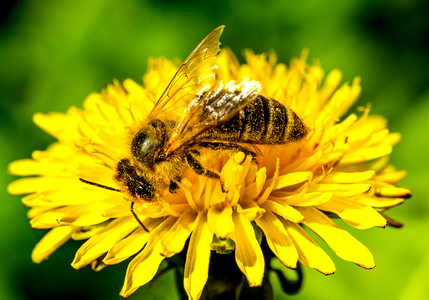100 signatures reached
To: Cabinet of Stockport Council
Stockport Council - Stop Using Glyphosate Pesticides!

We think that Stockport Council should copy other councils who have actually stopped using the pesticide and do things differently.
They should manage our urban areas to support and encourage wildlife. That might just mean beautiful pollen filled dandelions, eking out life at pavement edges.
They should manage our urban areas to support and encourage wildlife. That might just mean beautiful pollen filled dandelions, eking out life at pavement edges.
Why is this important?
Chris Packham the TV presenter is part of an organisation called Wild Justice and last year they raised the issue of glyphosates being used by local authorities in public spaces.
Glyphosate (also known as Roundup) is one of the most-used individual pesticides in the world. It is used as a herbicide in agriculture, in public spaces (such as parks but also in the streets) and in private spaces such as gardens.
Wild Justice encouraged people to contact their council to find out about the local situation. They provided a template to allow people to submit a Freedom Of Information request. Sustainable Bramhall contacted Stockport Council and the reply is below; Stockport Council is clearly still using glyphosates:
https://www.whatdotheyknow.com/request/herbicide_use_requests_for_infor#incoming-1903081
The use of glyphosates is an issue about which many organisations have raised concerns, over time, such as Pesticides Action Network. [1] In March 2015, the International Agency for Research on Cancer classified glyphosate as ‘probably carcinogenic to humans’. [2]
There is a live debate about glyphosate’s environmental impacts and use in gardens. [3] Glyphosate kills plants that insects and birds depend on for food. The Soil Association reports that research indicates potential impacts in increasing crop diseases, changing the composition and functioning of soil micro-organism species and ecosystems, and recently published studies are showing a negative impact on earthworms. [4] There is also evidence that glyphosates can enter water courses and affect plant life there affecting habitats for other organisms.
Recent research also suggests that glyphosate can kill honey bees by affecting their immunity to pathogens. [5] Bees are essential pollinators of plants including crops for food.
Please sign our petition to ask Stockport Council to give up on glyphosates. If you still use them at home, perhaps you should give up too, but be careful of how you dispose of them.
References:
[1] https://www.pan-uk.org/pesticide-free/
[2] https://www.iarc.who.int/featured-news/media-centre-iarc-news-glyphosate/
[3] https://www.gardenorganic.org.uk/glyphosate-debate
[4] https://www.soilassociation.org/media/7202/glyphosate-and-soil-health-full-report.pdf
[5] https://e360.yale.edu/features/bee-alert-is-a-controversial-herbicide-harming-honeybees
For more information about the Wild Justice Campaign see here:
https://wildjustice.org.uk/glyphosate/glyphosate-use-by-local-authorities/
Glyphosate (also known as Roundup) is one of the most-used individual pesticides in the world. It is used as a herbicide in agriculture, in public spaces (such as parks but also in the streets) and in private spaces such as gardens.
Wild Justice encouraged people to contact their council to find out about the local situation. They provided a template to allow people to submit a Freedom Of Information request. Sustainable Bramhall contacted Stockport Council and the reply is below; Stockport Council is clearly still using glyphosates:
https://www.whatdotheyknow.com/request/herbicide_use_requests_for_infor#incoming-1903081
The use of glyphosates is an issue about which many organisations have raised concerns, over time, such as Pesticides Action Network. [1] In March 2015, the International Agency for Research on Cancer classified glyphosate as ‘probably carcinogenic to humans’. [2]
There is a live debate about glyphosate’s environmental impacts and use in gardens. [3] Glyphosate kills plants that insects and birds depend on for food. The Soil Association reports that research indicates potential impacts in increasing crop diseases, changing the composition and functioning of soil micro-organism species and ecosystems, and recently published studies are showing a negative impact on earthworms. [4] There is also evidence that glyphosates can enter water courses and affect plant life there affecting habitats for other organisms.
Recent research also suggests that glyphosate can kill honey bees by affecting their immunity to pathogens. [5] Bees are essential pollinators of plants including crops for food.
Please sign our petition to ask Stockport Council to give up on glyphosates. If you still use them at home, perhaps you should give up too, but be careful of how you dispose of them.
References:
[1] https://www.pan-uk.org/pesticide-free/
[2] https://www.iarc.who.int/featured-news/media-centre-iarc-news-glyphosate/
[3] https://www.gardenorganic.org.uk/glyphosate-debate
[4] https://www.soilassociation.org/media/7202/glyphosate-and-soil-health-full-report.pdf
[5] https://e360.yale.edu/features/bee-alert-is-a-controversial-herbicide-harming-honeybees
For more information about the Wild Justice Campaign see here:
https://wildjustice.org.uk/glyphosate/glyphosate-use-by-local-authorities/
How it will be delivered
To the Leader of Stockport Council at a council meeting in the future.

